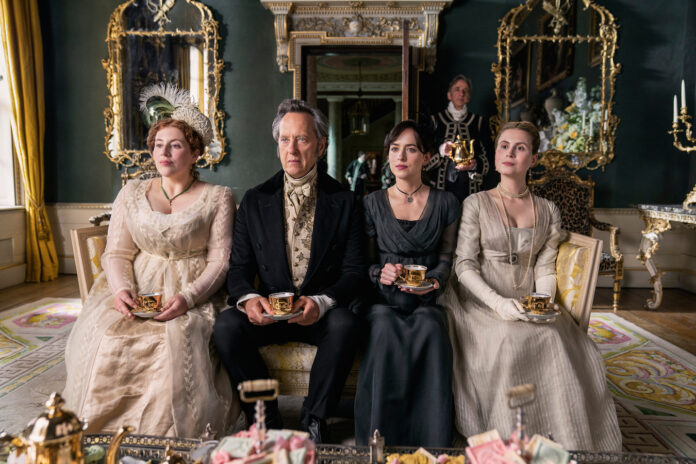LONDON: Imagine the meeting in which Netflix execs decided the idea of a new adaptation of Jane Austen’s “Persuasion” was a good one, only for some bright spark to chip in with a suggestion: What if the literary classic, beloved by millions and adapted many times into successful period movies and series, was a bit more… “Fleabag”.
After all, as good as Austen was at crafting finely poised tales of the landed gentry and examining social constructs, surely she would have wanted to throw in a couple of sly winks to camera and gag-worthy attempts to speak to the TikTok generation, if only she’d known such a thing existed, right?
And if that glib, ‘down with the kids’ approach isn’t enough to have you retching, then there’s the actual execution to consider — ‘execution’ being an apt description for a movie that ham-fistedly batters the life out of Austen’s original.
The heroine, Anne Elliot — once the epitome of English spirit and independence — is mangled by American actress Dakota Johnson, and Frederick Wentworth, all confidence and brooding silence, is butchered by Cosmo Jarvis, whose supposedly lovestruck captain is a bland miasma of awkwardness and incomprehensible delivery.
Cosmo Jarvis as Frederick Wentworth in Netflix’s ‘Persuasion.’ (Supplied)
In this version of “Persuasion,” it’s hard to see what Anne could possibly love about Wentworth, and even harder to imagine she’d be sad not to have married him.
Acclaimed British theater director Carrie Cracknell finds herself at the helm of this baffling film, unable to successfully ‘modernize’ Austen’s source material without stripping it of any of its original qualities, and (presumably) struggling to offer her cast much advice in terms of motivation for their own misguided attempts.
If you must stick it out to the end, heed this advice: Watch “Persuasion” with someone familiar with Austen’s original classic, or with the excellent 2007 adaptation starring Sally Hawkins and Rupert Penry-Jones. Their howls of anguish as the Netflix version chops and changes scenes, or contrives entirely new ones, or mangles Austen’s dialog in an attempt to update it for a new generation will, at least, take you on some kind of emotional journey during a movie incapable of achieving that on its own.


